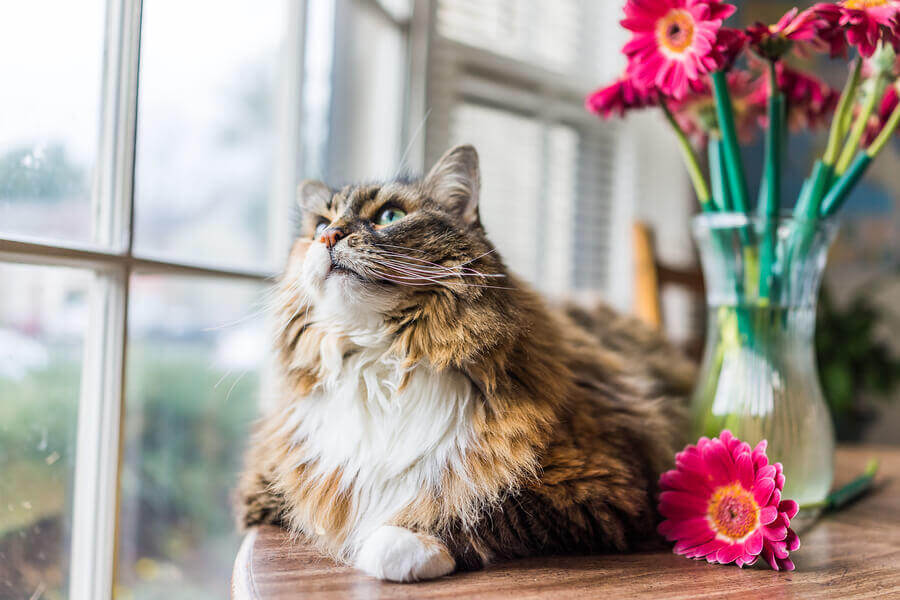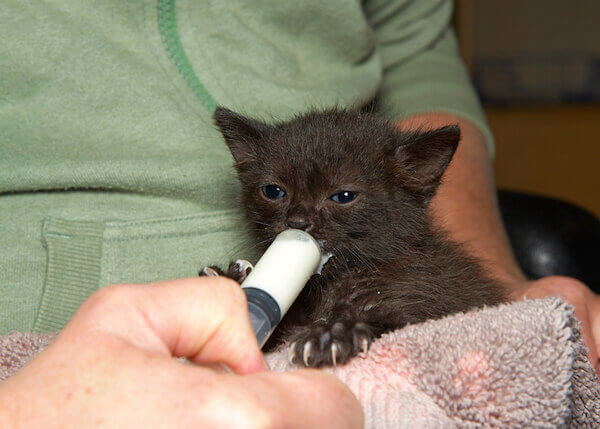There are all sorts of things that can cause runny poo in our feline friends. From worm burdens to infectious diseases, it can sometimes be hard to know what is behind those frequent and runny bowel movements. Diarrhea is unpleasant for both the cat and also the poor owner who is left ‘picking up the pieces’, so to speak!
When it comes to finding the right treatment, we need to take a closer look at things.
- Cats can suffer from acute (comes on suddenly) or chronic (lasts a long time or constantly recurs) diarrhea.
- Cats will also suffer from two different ‘types’ of diarrhea: small intestinal or large intestinal. Who would have known runny poop could be so complicated and scientific?

Small Intestinal
Those suffering with small intestinal diarrhea will usually pass liquid poop with a slight increase in frequency. There is no straining and the poop is produced easily. Some kitties may also experience vomiting and weight loss. Owners might notice a ‘grumbly’ tummy if they listen closely. If there were to be any blood in this type of diarrhea (which would be uncommon), it would be tarry and black as it has been digested while traveling through the intestinal tract. The most common causes of small intestinal diarrhea are viruses, infections, food allergies, diet changes, parasites, Inflammatory Bowel Disease (IBD), pancreatic insufficiency, systemic disease and even some types of cancer.
Large Intestinal
Large intestinal diarrhea is quite different and those animals who are affected will pass small quantities of stool little and often, sometimes up to ten times a day. Straining is a frequent feature and owners may become concerned that their cat is spending obscene amounts of time in the litter tray. It would not be unusual to see some mucus (slime) and fresh red blood in this type of diarrhea. Large intestinal diarrhea has fewer causes and can be associated with colitis, Inflammatory Bowel Disease (IBD) and certain local growths or tumors.
As we can see, these two types of diarrhea have different causes and they do require different treatments.
Treatment Methods
In the first instance of diarrhea, a vet may suggest some symptomatic therapy. Sometimes, episodes of diarrhea are short-lasting and can be successfully treated without ever reaching a definite diagnosis. This can be the case, for example, if a cat has eating some gone off food when outside. Though we may never know what infection exactly they contracted, we can treat them and they will improve.
- To manage small intestinal diarrhea that has only been going on for a day or two, it may be worth withholding food for 24 hours to rest the gut. However, this is not advised in young, old or noticeably unwell or dehydrated animals.
- After the fasting period, owners can give small amounts of tasty, digestible food little and often. There are a number of ‘gastro-intestinal’ or ‘sensitivity’ diets on the market that can be useful.
- An alternative, for those owners who have some extra time, would be to cook up some bland, skinless boiled white chicken and boiled white rice to feed.
- A vet may also choose to prescribe some anti-diarrhea paste containing kaolin and pectin which can bulk up the stool and prevent too much water being lost.
- Most will also contain probiotics, which can be useful to prevent the proliferation of ‘bad bacteria’ during a stomach upset.
- These pastes are easy to give into the mouth and are typically given once a day for three days or so.
- For fussy kitties who dislike having pastes plopped in their mouth, owners can mix it into the food.
Owners are always keen to know if they need to come to the vet for a short episode of small intestinal diarrhea. While a vet visit is never a bad idea, if the cat is otherwise well and is active and eating with no other symptoms, a day or two of diarrhea can typically be managed at home. Count your cat lucky!
Treating short episodes of large intestinal diarrhea is a little different.
- The mainstay of at-home therapy is a high fiber diet and a fiber supplement. There are many forms of fiber supplements on the market and they are available as pellets and pastes to be mixed into the food.
- Sometimes, vets will prescribe an anti-inflammatory, antibiotic drug called ‘Sulfasalazine’ and/or an antibiotic called ‘Metronidazole’, though this would be case dependent.
Examinations and Testing
When it comes to examining a cat with small intestinal diarrhea, as well as performing a thorough physical exam, a vet will want to run some general blood tests and a faecal exam. These basic tests are simple and affordable and will elicit an answer quickly in many cases. Those with parasitic burdens, metabolic diseases and certain infections will be picked up on these initial screening tests. Sometimes, these first tests will come back normal and the vet will order some further diagnostic tests, such as abdominal scans and endoscopies.
When a thickened gut is detected in those patients with chronic small intestinal diarrhea with weight loss, it is usually advised that a gut biopsy is taken. This requires a general anaesthetic and the sample will either be taken via endoscopy (a camera that goes into the stomach and small intestine via the mouth), or via exploratory surgery. Many vets will prefer to perform an exploratory surgery as it enables them to get good, full-thickness samples of the guts and gives them the opportunity to have a look at what is going on inside the abdomen. Taking biopsies is not without its risks and the decision to take them will not be made lightly. However, it is vital to determine what is going on and to find out if a cancerous process, such as intestinal lymphoma, is the cause of the thickened gut.

Those with large intestinal diarrhea will usually receive their diagnosis in a similar manner. They too will have a thorough physical exam as well as some basic blood and faecal tests. The vet may wish to perform a rectal exam, depending on the size of the cat. A rectal exam can determine if there are any masses present, such as polyps, and can allow the vet to palpate and express the anal glands. For some cats, a colonoscopy will be performed under general anaesthetic to better assess the internal tissue.
Once a diagnosis is reached, targeted and tailored treatment can begin.
There are many feline diseases which cause diarrhea as a symptom, such as:
- hyperthyroidism
- chronic kidney disease
- diabetes
Of course, these animals will usually have other symptoms that can give us clues as to what is going on. For example, a cat who has diarrhea due to an overactive thyroid will also tend to have a ravenous hunger, increased energy levels and a swelling (goitre) in the region of their thyroid gland. For most, treating the disease will improve, and usually resolve, the chronic diarrhea.
If the diarrhea is found to be dietary related, such as may be the case with IBD or a food allergy, the treatment will largely consist of a life-long diet change. Cats may be prescribed a hydrolyzed, hypoallergenic diet that is easier for them to digest. For whatever reason, the immune system of these cats no longer tolerates
their regular food or bacteria flora, so we need to modify what we are giving them. Supplementing these diets with anti-oxidants and prebiotics has shown promising results in several studies. Those kitties on specific diets must not be fed anything else at all, which includes human scraps or feline treats. For some owners, particularly those who own several cats or who let their cats outside, this can pose a real challenge. It can be useful to change all cats in the house onto the special diet. Similarly, if the cat goes outside, they should wear a collar that says ‘DO NOT FEED ME’ and that has a bell on it, making any hunting attempts less likely to be successful!
While determining what is causing diarrhea is not always straight-forward, it allows us to provide our kitties with the right treatment and to get on top of the problem once and for all.
